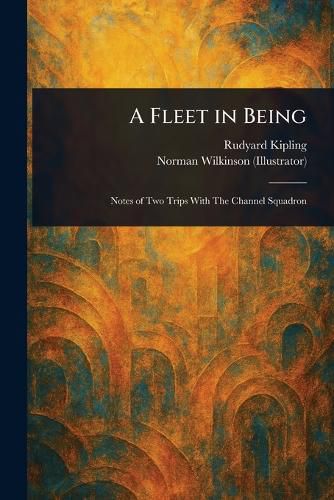Readings Newsletter
Become a Readings Member to make your shopping experience even easier.
Sign in or sign up for free!
You’re not far away from qualifying for FREE standard shipping within Australia
You’ve qualified for FREE standard shipping within Australia
The cart is loading…






This title is printed to order. This book may have been self-published. If so, we cannot guarantee the quality of the content. In the main most books will have gone through the editing process however some may not. We therefore suggest that you be aware of this before ordering this book. If in doubt check either the author or publisher’s details as we are unable to accept any returns unless they are faulty. Please contact us if you have any questions.
"A Fleet in Being: Notes of Two Trips With The Channel Squadron" offers a fascinating glimpse into the world of the British Royal Navy at the turn of the 20th century. Penned by Rudyard Kipling, this historical account details the author's observations during two voyages with the Channel Squadron.
Kipling, a keen observer of his time, provides a unique perspective on the workings of the navy, offering insights into the ships, the sailors, and the strategic importance of naval power. This volume captures the spirit and atmosphere of a bygone era, making it essential reading for anyone interested in naval history, military travel, and the role of the Royal Navy in shaping Great Britain's global presence. It serves as a valuable resource for understanding the development and operational aspects of the British Navy. This republication preserves the historical integrity of Kipling's original work.
This work has been selected by scholars as being culturally important, and is part of the knowledge base of civilization as we know it.
This work is in the public domain in the United States of America, and possibly other nations. Within the United States, you may freely copy and distribute this work, as no entity (individual or corporate) has a copyright on the body of the work.
Scholars believe, and we concur, that this work is important enough to be preserved, reproduced, and made generally available to the public. We appreciate your support of the preservation process, and thank you for being an important part of keeping this knowledge alive and relevant.
$9.00 standard shipping within Australia
FREE standard shipping within Australia for orders over $100.00
Express & International shipping calculated at checkout
This title is printed to order. This book may have been self-published. If so, we cannot guarantee the quality of the content. In the main most books will have gone through the editing process however some may not. We therefore suggest that you be aware of this before ordering this book. If in doubt check either the author or publisher’s details as we are unable to accept any returns unless they are faulty. Please contact us if you have any questions.
"A Fleet in Being: Notes of Two Trips With The Channel Squadron" offers a fascinating glimpse into the world of the British Royal Navy at the turn of the 20th century. Penned by Rudyard Kipling, this historical account details the author's observations during two voyages with the Channel Squadron.
Kipling, a keen observer of his time, provides a unique perspective on the workings of the navy, offering insights into the ships, the sailors, and the strategic importance of naval power. This volume captures the spirit and atmosphere of a bygone era, making it essential reading for anyone interested in naval history, military travel, and the role of the Royal Navy in shaping Great Britain's global presence. It serves as a valuable resource for understanding the development and operational aspects of the British Navy. This republication preserves the historical integrity of Kipling's original work.
This work has been selected by scholars as being culturally important, and is part of the knowledge base of civilization as we know it.
This work is in the public domain in the United States of America, and possibly other nations. Within the United States, you may freely copy and distribute this work, as no entity (individual or corporate) has a copyright on the body of the work.
Scholars believe, and we concur, that this work is important enough to be preserved, reproduced, and made generally available to the public. We appreciate your support of the preservation process, and thank you for being an important part of keeping this knowledge alive and relevant.